If you’re looking for a portable air conditioner unit, but aren’t sure where to start, we’ve got you covered.
This guide takes a look at 5 popular portable AC models.
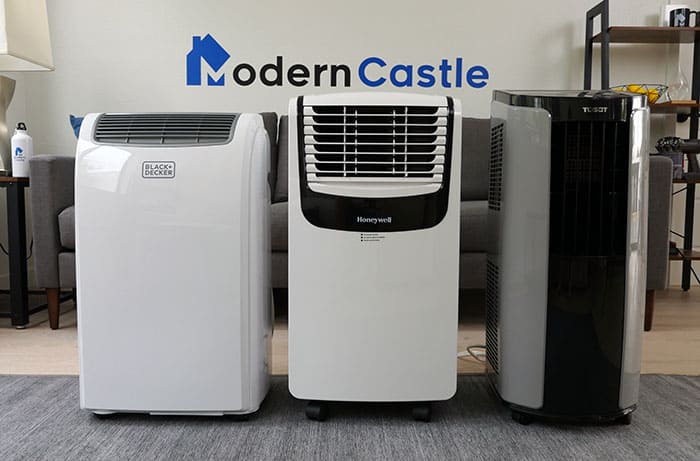
Honeywell vs. Black & Decker vs. DeLonghi vs. Whynter vs. TOSOT—which name is best for cooling performance?
Let’s find out!
Honeywell vs. Black & Decker vs. DeLonghi vs. Whynter vs. TOSOT
The five models we’re going to look at include:
While most of these units are fairly similar, there are a few differences.
| PRODUCT | DETAILS | ||
|---|---|---|---|
Most Portable 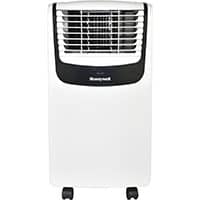 | Honeywell MO08CESWK |
| Check Price |
Most Coverage  | DeLonghi PACEX390LVYN |
| Check Price |
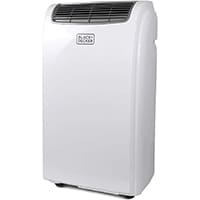 | Black & Decker BPACT08WT |
| Check Price |
BEST AIR FLOW  | Whynter ARC-14S |
| Check Price |
Best Value 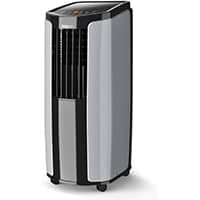 | TOSOT |
| Check Price |
If you would prefer to watch rather than read we’ve got our full portable AC video review here:
Performance
To date, we have personally tested 3 of the 5 models compared here (the Black & Decker, Honeywell, and TOSOT). All 5 models compared here were chosen because they are among the most popular choices with many consumers.
All of these tests took place under the following conditions:
- Location: Phoenix, Arizona
- Building: Frame construction, foam roof, fiberglass insulation, stucco exterior, built 2007, renovated 2020, 950 square feet.
- Room: Testing room is a ~10’ x 14’, vaulted ceilings
With the performance test, we were looking at the following factors:
- 4-hour span within the same day
- Internal & External temperature
- Internal & External humidity
- AC Unit running constantly, attempting to achieve a temperature of 72° F
With all of those factors in mind, here are the conclusions we found.
Honeywell Tests

The Honeywell reduced the indoor air temperature 11.3°F, from 91.3° down to 80.0°F (with an outdoor temperature range of 93-102°F) within a 4-hour span. This unit cooled the indoor air by 12.4%.
Read our full Honeywell Portable AC review here.
TOSOT Tests
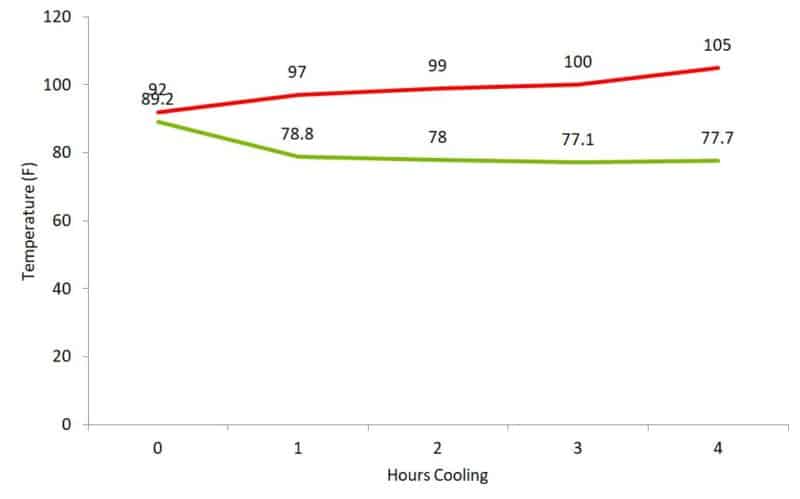
The TOSOT reduced the indoor air temperature 11.5°F, from 89.2° down to 77.7°F (with an outdoor temperature range of 92-105°F) within a 4-hour span. This unit cooled the indoor air by 12.9%.
Read our full TOSOT portable AC review here.
Black + Decker Tests
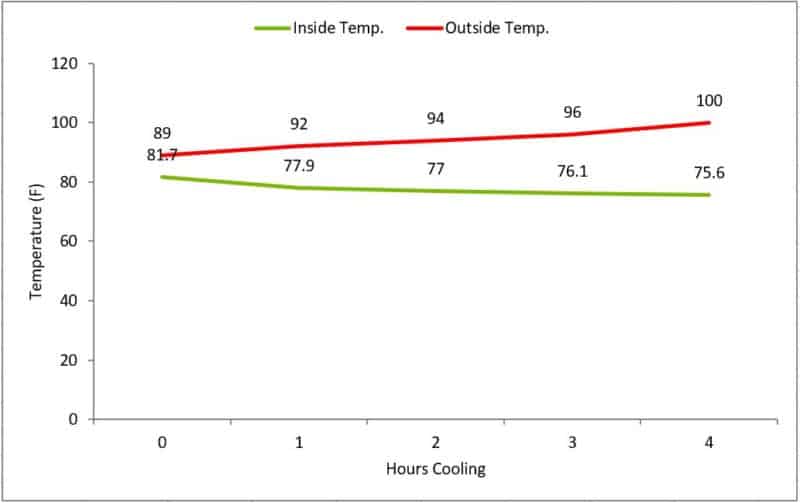
The Black + Decker reduced the indoor air temperature 6.1°F, from 81.7° down to 75.6°F (with an outdoor temperature range of 89-100°F) within a 4-hour span. This unit cooled the indoor air by 7.5%.
Read our full Black & Decker Portable AC review here.
Test Results Takeaways
The TOSOT has the most noticeable change in indoor air temperature, taking it from 89.2°F down to 77.7°F within a 4-hour span.
But the Black + Decker was able to achieve the coolest temperature, at 75.6°F. TOSOT only got to 77.7 and Honeywell even higher at 80.0°F.
Although we haven’t tested the Whynter or De’Longhi, we do know that those are 14,000 BTU units (at least the popular models we picked for this comparison).
All of the units tested above max out at 8,000 BTUs. So with that in mind, I would expect these two models to perform at least as good, if not better, than any of the three models listed above.
Cooling Performance by BTUs
Bear in mind, there are small, medium, and large coverage portable air conditioners for all of these brands. Most typically start around 8,000 BTU and max out around 14,000 BTUs.
Here are a few examples:
- 10,000 BTU Black & Decker
- 12,000 BTU Black & Decker
- 14,000 BTU Black & Decker
- 10,000 BTU Honeywell
- 12,000 BTU Whynter
- 14,000 BTU Whynter
- More Complete List of Models
More BTU typically means better cooling square footage coverage. But, it also typically means more expensive. So you should focus on finding enough BTUs for your space, but not much extra (to help keep costs lower).
The Design
All five of these units are portable air conditioners with similar features.
They are designed to be used in areas that lack a central air conditioning unit or space where you want to supplement your system with an additional cooling source.
Common similarities between all models include:
- 3-in-1: fan, dehumidifier, and air conditioner
- Wheeled base
- In-window installation with exhaust hose
- Includes remote control
- Variable fan speed
- Digital display to show the temperature in Fahrenheit or Celcius
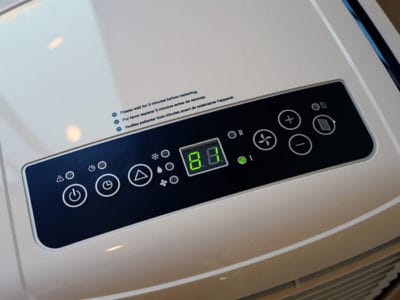

The Honeywell and Black + Decker units have a white glossy body with a vent grill and controls towards the top of the air conditioner.
Honeywell

Black + Decker

TOSOT has a similar style of the aforementioned two, but has a grey / black body instead of white and slightly different vent placement.
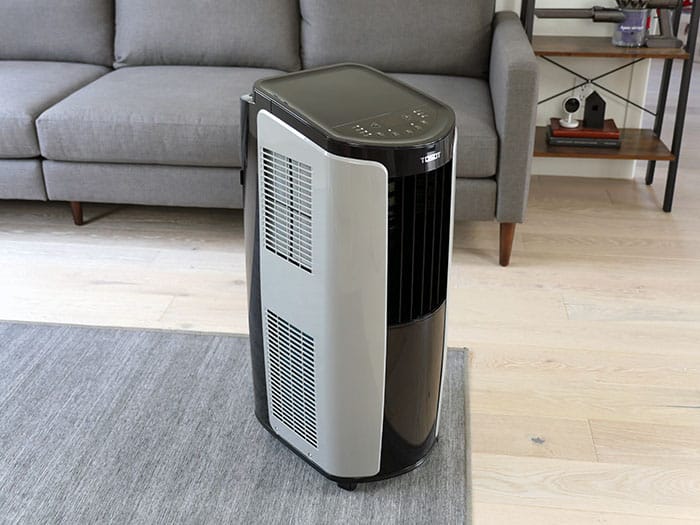
Both the Whynter and De’Longhi have digital displays on the front of the unit with movable vents that fold out from the top. Controls are located on the front with these two air conditioners.
DeLonghi

Whynter

Remote Control
All of these air conditioners include a remote control for additional options, but bear in mind, not all remotes are created equal.
Here are a few special features that I’d like to call out.
The Black + Decker, Whynter, and TOSOT unit are the only models featured in this comparison with a digital screen that lists the temperature on the remote itself.


De’Longhi and Honeywell lack the digital display but are still good options.
The De’Longhi unit is the only one that uses Bluetooth connectivity instead of infrared light. This means you can control the AC anywhere within range of the Bluetooth signal network.
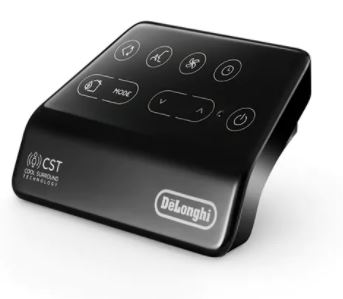
For the sake of comparison, here’s a quick view of the Honeywell remote control. It uses simple silicon push buttons and controls the unit with infrared light.
As long as you have a direct shot of the air conditioner, you’ll be able to change fan speeds, adjust modes, or make other changes (WiFi-free).
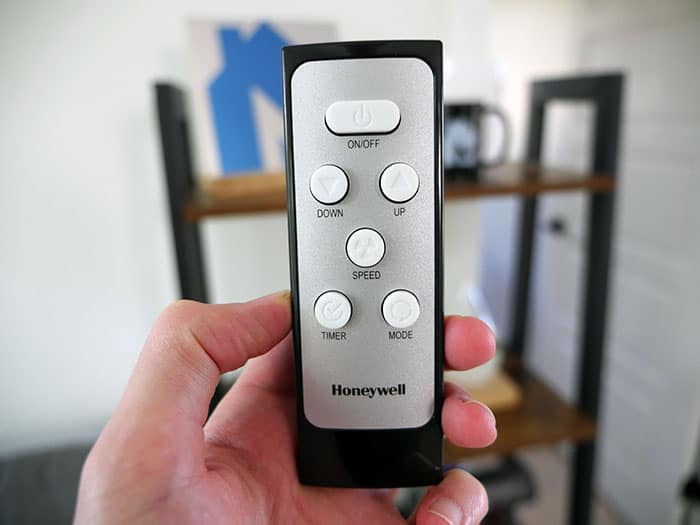
Size & Dimensions
All of these units are pretty large and heavy. The wheeled base does help to keep them portable, but it still takes a lot of mass to air condition large spaces.
Here’s how the sizes compare with each other. For a quick overview, the most compact unit is the Black + Decker (size-wise), but the lightest unit is the Honeywell, coming in almost 10 pounds lighter than the Black + Decker.
Honeywell (lightest)
- Size: 13.5 x 14.6 x 27.7″
- Weight: 43 pounds
De’Longhi (heaviest)
- Size: 14 x 16.3 x 31.5″
- Weight: 83 pounds
Whynter (tallest)
- Size: 19 x 16 x 35.5″
- Weight: 80 pounds
Black + Decker (most compact)
- Size: 16.5 x 11.5 x 26″
- Weight: 52.9 pounds
- Size: 11.8 x 15.4 x 30.4″
- Weight: 65 pounds
Area Coverage
The power of a portable AC unit is measured in BTUs, so understandably so, they play also play a big role in how much area an air conditioner can cover.
WHAT DOES BTU STAND FOR? BTU stands for British Thermal Unit. It’s a form of measurement that measures energy. More BTUs in an AC unit translates to more energy for air conditioning.
Here are the five features models in rank from largest area coverage to smallest. You can see the units with the higher BTUs cover the most area.
- De’Longhi: 14,000 BTU and up to 700 sf. of area coverage
- Whynter: 14,000 BTU and up to 500 sf. of area coverage
- TOSOT: 8,000 BTU and up to 300 sf. of rea coverage
- Honeywell: 8,000 BTU and up to 250 sf. of area coverage
- Black + Decker: 8,000 BTU and up to 200 sf. of area coverage
Setup and Usability
The setup of all of these units is similar since they are all in-window installs. It includes the parts you need for the install, remote control, and simple maintenance and not much else.
What’s in the box?
Exact contents vary between each model, but there are a few similarities.
The basic parts that come with all five of these models listed include:
- Portable air conditioner
- Wireless remote control
- Window kit
- User manual
How difficult is install?
The install for each of these units is relatively simple and takes about 30 minutes.
Want the fastest install? Go with the Honeywell. It skips the foam sealing tape and uses a wingbolt for the window kit instead of screw which means you can install without any tools.
The Window Kit is a bit different within each model, but it generally includes a flexible exhaust hose, a window cover, and in some case foam window sealing tape.

I will add here that some, but not ALL models, come with a piece of foam tape which helps to seal any gaps between the window casing and the slide-in plate.
TOSOT and Black + Decker come with foam window tape that seals the gaps while Whynter, De’Longhi and Honeywell do not include this piece.
Of course, foam sealing tape is a simple add-on you could easily do yourself. You can buy it here.
Special Features
- The Wynter portable AC unit has dual exhaust hoses for more airflow.
- The TOSOT exhaust hose has a protective grill to protect debris from falling in the exhaust hose.
- The Honeywell window kit uses wing bolts to tighten the window kit instead of screws for a faster install.
Compare the Specs
| Specifications | |||||
|---|---|---|---|---|---|
| Manufacturer | Honeywell | Black + Decker | DeLonghi | Whynter | TOSOT |
| Model | MO08CESWK | BPACT08WT | PACEX390LVYN | ARC-14S | |
| Width (inches) | 14.6" | 16.5" | 14" | 19" | 11.8" |
| Depth(inches) | 13.5" | 11.5" | 16.3" | 16" | 15.4" |
| Height | 27.7" | 26" | 31.5" | 35.5" | 30.4" |
| Weight | 43 pounds | 52.9 pounds | 83 pounds | 80 pounds | 65 pounds |
| Power | 8,000 BTU | 8,000 BTU | 14,000 BTU | 14,000 BTU | 8,000 BTU |
| Remote Control | Infrared | Infrared | Bluetooth | Infrared | Infrared |
| Room Coverage | Up to 250 sq. ft. | Up to 200 sq. ft. | Up to 700 sq. ft. | Up to 500 sq. ft. | Up to 300 sq. ft. |
| Returns | Varies by retailer | Varies by retailer | Varies by retailer | Varies by retailer | Varies by retailer |
| Warranty | 1-Year limited | 1-Year limited | 1-Year limited | 1-Year limited | 1-Year limited |
| Price | Check Price | Check Price | Check Price | Check Price | Check Price |
Which Portable AC Unit Should You Buy?
Alright, so we’ve made it to the end… still not sure which portable air conditioner is best for your space? We’ve broken down the five models tested and provided recommendations below, depending on what exactly you’re looking for.
Best Coverage: De’Longhi
For the best area coverage, the Delonghi is the best option in this comparison. This AC unit states that it can cool areas up to 700 square feet, which is 200 sf. over the closest second place unit, Whynter.

Click here to check the price for the De’Longhi portable AC unit.
Best Portability: Honeywell
If you’re looking for an AC unit with the best portability, the Honeywell is an excellent option. This unit is the lightest of all 5 models compared here, maxing out at only 43 pounds. (De’Longhi is the heaviest at 83 pounds.) This unit also had the quickest install and didn’t require any tools.

Click here to check the price for the Honeywell portable AC unit.
Best Value: TOSOT
From our in-home performance tests that we ran, the TOSOT air conditioner was arguably the best performing unit and definitely the best value (in our view). It dropped the indoor temperature by 11.5°F, from 89.2° down to 77.7°F within a 4-hour span. Granted, it does cap out around 300 sq. ft. for total coverage area. When you overlay these factors vs. its price point it makes for a strong value.

Click here to check the price for the TOSOT portable AC unit.
Best Airflow: Whynter
This unit has a 14,000 BTU max and is the only air conditioner in this review with a dual exhaust system, meaning it can output twice the amount of air as the other units. It would be a good choice for rapid cooling larger areas (up to 500 sq. ft.)

Click here to check the price for the Whynter portable AC unit.
OTHER: Click here to read the full review for the Black + Decker portable AC unit.
Still have questions?
If you’re still not sure which model is right for you, you can click here to send us a message. We do our best to respond within 24 hours and will be happy to make a custom recommendation for you.
Updates
- September 11, 2020 – Initial version of the page was published. Please note that TOSOT sent us their unit for free, as well as the Black & Decker and Honeywell units we tested. They did not require anything with respect to our review, content, scores, or comparison. All they asked was that we create a comparison and review their product (which we agreed to). You can read more about our disclosures, policies, and products we receive for free here.
